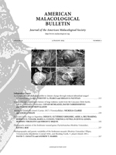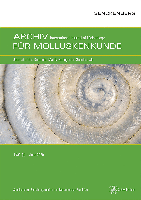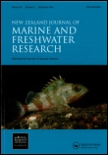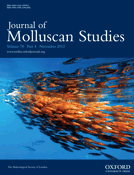
AMERICAN MALACOLOGICAL BULLETIN
metrics 2024
Unveiling the Secrets of Marine Biodiversity.
Introduction
American Malacological Bulletin is a distinguished journal published by the American Malacological Society, Inc., dedicated to advancing the field of malacology, which encompasses the study of mollusks and their ecological significance. Since its inception, the journal has provided a vital platform for the dissemination of research findings, reviews, and significant contributions from both established and emerging scholars. With an ISSN of 0740-2783 and an E-ISSN of 2162-2698, it holds a global reputation within its niche, albeit recognized within the Q4 category in both Aquatic Science and Ecology, Evolution, Behavior and Systematics based on its 2023 ranking. The bulletin's focus on fostering dialogue and collaboration among researchers around the world underscores its importance within the scientific community. As a resource housed in the Delaware Museum of Natural History, it actively contributes to the ongoing conversation on ecological conservation, biodiversity, and the evolving challenges facing marine ecosystems. Though not classified as an Open Access journal, it remains accessible to scholars and students eager to explore contemporary research in malacology.
Metrics 2024
 0.16
0.16 0.40
0.40 0.70
0.70 36
36Metrics History
Rank 2024
Scopus
IF (Web Of Science)
JCI (Web Of Science)
Quartile History
Similar Journals

ARCHIV FUR MOLLUSKENKUNDE
Unveiling the Wonders of Mollusk DiversityARCHIV FUR MOLLUSKENKUNDE, published by E SCHWEIZERBARTSCHE VERLAGSBUCHHANDLUNG, is a premier journal dedicated to the study of mollusks, covering a broad spectrum of topics from taxonomy and ecology to conservation and biodiversity. With its commitment to advancing knowledge and fostering collaboration within the malacological community, this journal serves as an essential resource for researchers, professionals, and students alike. Though it is not currently operated under an open-access model, it provides valuable insights and the latest findings in the field, making it indispensable for those involved in mollusk research. Scholars can access the journal's rich repository of articles, ensuring their work remains at the forefront of scientific inquiry. The journal operates out of Stuttgart, Germany, further emphasizing its European scholarly tradition in the environmental and biological sciences.

Aquatic Biology
Innovating Research for a Sustainable Aquatic FutureAquatic Biology, published by INTER-RESEARCH, is a leading open-access journal dedicated to the scientific exploration of aquatic ecosystems, promoting innovative research in the fields of aquatic science, ecology, and oceanography since its inception in 2007. With an E-ISSN of 1864-7782, the journal publishes original articles, reviews, and data papers that contribute to the understanding of aquatic biology in its myriad forms. As of 2023, it holds a respectable Q3 ranking across multiple categories including Aquatic Science and Ecology, reflecting its sustained impact within the scientific community. Situated in Germany, Aquatic Biology operates a policy of open access since 2014, ensuring that valuable research findings are readily available to researchers, professionals, and students worldwide, thus fostering collaboration and knowledge dissemination. By addressing diverse aquatic topics, the journal plays a crucial role in advancing the study and conservation of marine and freshwater environments, making it an essential resource for anyone seeking to deepen their understanding of aquatic systems.

NEW ZEALAND JOURNAL OF MARINE AND FRESHWATER RESEARCH
Fostering Insights into Biodiversity and ConservationNEW ZEALAND JOURNAL OF MARINE AND FRESHWATER RESEARCH, published by Taylor & Francis Ltd, stands as a distinguished platform for the dissemination of innovative research in the realms of aquatic science and ecology. With an ISSN of 0028-8330 and E-ISSN 1175-8805, this journal has been curating significant scientific contributions since its inception in 1967, continuing through to 2024. Recognized in the Q2 category across multiple relevant fields—including Aquatic Science, Ecology, and Water Science—this journal ranks notably in Scopus, with a 74th percentile for Ecology, Evolution, Behavior and Systematics, highlighting its impact and relevance within the scientific community. Though not an open-access publication, its rigorous peer-reviewed articles offer insights that resonate with researchers, professionals, and students who are passionate about advancing our understanding of freshwater and marine ecosystems. By fostering a collaborative space for ecological and environmental inquiries, the NEW ZEALAND JOURNAL OF MARINE AND FRESHWATER RESEARCH is essential for those aiming to contribute to the vital conversations around biodiversity, conservation, and sustainable management of aquatic resources.

JOURNAL OF CONCHOLOGY
Exploring the Depths of Conchological ResearchJOURNAL OF CONCHOLOGY, published by the Conchological Society of Great Britain & Ireland, is a prominent academic journal focused on the study of mollusks, specifically their taxonomy, ecology, and evolutionary biology. Through its rigorous peer-review process, it aims to provide a platform for significant research in the field, fostering deeper understanding and appreciation of these diverse organisms. Although it is not currently an Open Access journal, its publications contribute notably to the fields of Agricultural and Biological Sciences, notably in Ecology, Evolution, Behavior and Systematics and Aquatic Science, as indicated by its rankings in Scopus. The journal's archives trace comprehensive coverage from 1981 to 1990 and from 1996 to 2018. With its commitment to advancing conchological knowledge, the JOURNAL OF CONCHOLOGY serves as a crucial resource for researchers, professionals, and students invested in the biological and ecological dimensions of mollusk studies.

Tropical Life Sciences Research
Championing High-Quality Research in Tropical Health and BiodiversityTropical Life Sciences Research, published by PENERBIT UNIVERSITI SAINS MALAYSIA, is an esteemed open-access journal dedicated to the realms of Agricultural and Biological Sciences, Biochemistry, Genetics, and Molecular Biology, and Medicine. Since its inception in 2006, this journal has established itself as a significant platform for disseminating high-quality research findings that contribute to the understanding of tropical biodiversity and health-related issues. With its innovative approach, Tropical Life Sciences Research has garnered an impressive impact factor, reflecting its influence in the academic community; it is ranked Q2 in Agricultural and Biological Sciences and Q3 in both Biochemistry and Medicine categories as of 2023. Researchers and professionals can access a wealth of knowledge through this journal, whose content spans from 2009 to 2024, making it a vital resource for students and experts alike interested in advancing the science of tropical ecosystems and health. The journal also stands out for its comprehensive Scopus rankings, indicating its relevance and quality in the competitive academic landscape.

Marine Biodiversity
Championing Research in Marine EcosystemsMarine Biodiversity, published by SPRINGER HEIDELBERG, stands as a pivotal journal in the fields of Aquatic Science, Ecology, Evolution, Behavior and Systematics, and Oceanography. Established in 2009, it has gained a prominent place in academic discourse, evidenced by its Q2 ranking across multiple categories in the latest 2023 assessments. The journal operates out of Germany, specifically from its Heidelberg address, and caters to an international audience with a keen interest in the vast and complex dynamics of marine ecosystems. With an ongoing convergence of research outputs until 2024, Marine Biodiversity encourages contributions that expand our comprehension of marine life and its conservation, positioning itself as a vital resource for researchers, professionals, and students alike. Although currently not an open access journal, it maintains a robust reputation backed by its favorable Scopus ranks, which indicate its significant contribution to the respective fields. By disseminating high-quality, peer-reviewed articles, Marine Biodiversity plays an essential role in promoting scholarly communication and advancement in marine science.

JOURNAL OF ORNITHOLOGY
Advancing Knowledge in Bird ConservationJOURNAL OF ORNITHOLOGY, published by Springer Heidelberg, is a leading international journal dedicated to the study of birds and their conservation. With an ISSN of 2193-7192 and an E-ISSN of 2193-7206, this journal serves as a crucial platform for disseminating innovative research focused on avian biology, ecology, and behavior, making significant contributions to the fields of Agricultural and Biological Sciences and Animal Science and Zoology, where it holds a commendable rank of #156 out of 490 in Scopus. Established from 2004 and continuing through 2024, the journal strives not only to advance academic scholarship but also to inform practical conservation efforts globally. While currently not open access, it remains a vital resource for researchers, professionals, and students seeking high-quality studies and findings that influence the understanding and preservation of bird species. The journal's commitment to excellence in science highlights its importance in ornithological research, offering insights that are both profound and actionable.

BULLETIN OF MARINE SCIENCE
Unveiling the secrets of the sea through science.BULLETIN OF MARINE SCIENCE, published by Rosenstiel School of Marine and Atmospheric Science, is a prominent journal dedicated to advancing the field of marine science through scholarly research and peer-reviewed articles. With an ISSN of 0007-4977 and an E-ISSN of 1553-6955, this journal has been contributing to significant scientific discourse since its inception in 1973. Covering a wide spectrum of topics in aquatic sciences and oceanography, it has maintained a respectable position in the academic community, as evidenced by its Q3 ranking in both categories for 2023. Although currently not an open-access journal, it provides essential access to groundbreaking research that informs marine conservation, ecological studies, and atmospheric sciences. Situated in the United States at 4600 Rickenbacker Causeway, Miami, FL 33149, the journal serves as a vital resource for researchers, professionals, and students seeking to engage with the latest findings in marine science and foster a deeper understanding of our oceans.

CYBIUM
Exploring the depths of fish biology and ecology.CYBIUM is a reputable journal published by the Société Française d'Ichtyologie, dedicated to advancing research within the fields of Animal Science and Zoology as well as Ecology, Evolution, Behavior and Systematics. With a commitment to fostering scientific dialogue, CYBIUM has been a valuable resource for scholars since its inception in 1996, reporting on a wide array of ichthyological studies and aquatic biology. The journal is recognized in the 2023 Scopus rankings with a notable position in the Q3 quartile for Animal Science and Zoology and Q4 for Ecology, Evolution, Behavior and Systematics, reflecting its growing influence in these disciplines. Although currently not categorized as Open Access, CYBIUM continues to provide essential insights into fish biology and ecology from the heart of France, the Museum national d'Histoire naturelle in Paris. Researchers, professionals, and students in related fields will find CYBIUM an indispensable tool for staying informed about the latest developments and research trends within ichthyology and marine sciences.

JOURNAL OF MOLLUSCAN STUDIES
Advancing molluscan knowledge for a sustainable future.JOURNAL OF MOLLUSCAN STUDIES, published by Oxford University Press, is a preeminent academic journal dedicated to advancing the understanding of molluscan biology, ecology, and conservation. With an ISSN of 0260-1230 and E-ISSN of 1464-3766, this journal is pivotal in shaping the field of molluscan research, offering a platform for original articles, reviews, and critical discussions from both fundamental and applied perspectives. As a testament to its quality, the journal is categorized in the second quartile (Q2) for both Animal Science and Zoology, and Aquatic Science, reflecting its significance within the scientific community, as evidenced by its Scopus ranks. The journal serves a diverse audience including researchers, professionals, and students, enriching their understanding of molluscan species and their ecological roles, as well as highlighting conservation efforts essential for biodiversity. Spanning an extensive publication history since 1899, the JOURNAL OF MOLLUSCAN STUDIES continues to be a vital resource for those dedicated to the study of mollusks in all their forms.